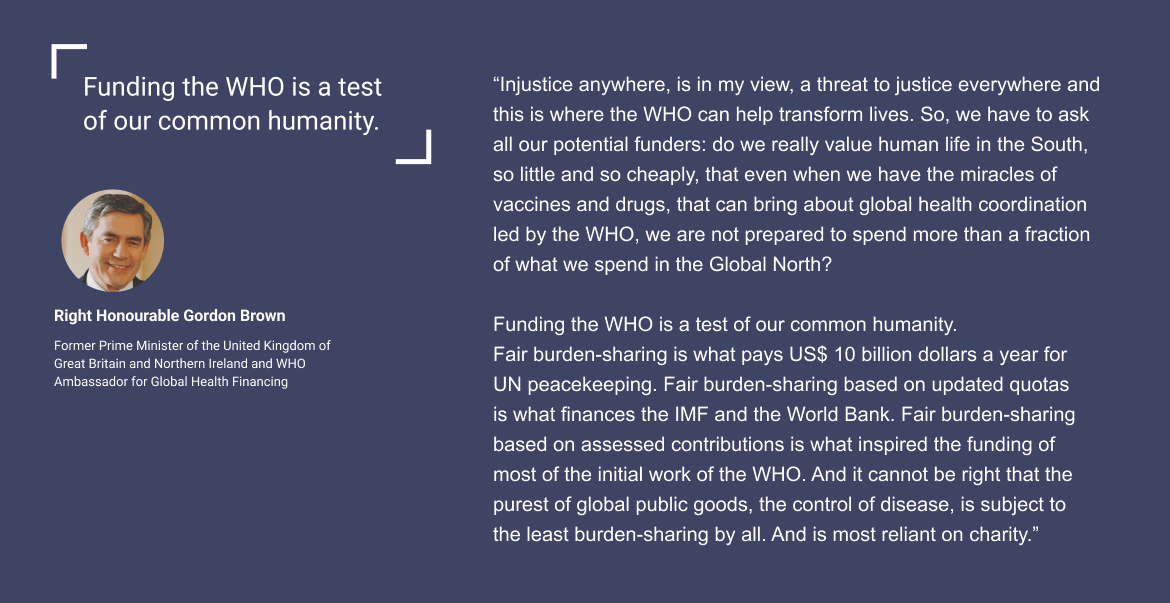
Chapter 6
Current state of WHO's financing
Current state of WHO’s financing
The way in which funds are provided to WHO constrains the efficiency of the Organization and its ability to maximize returns on investment.
For much of the Organization’s history most of its funds were provided through assessed contributions made by Member States, but in recent decades these have been capped and today account for only 16% of WHO’s total budget. As these assessed contributions have declined in real terms, they have been replaced over time by an increasing share of funding to WHO coming as voluntary contributions where donors direct funding according to their priorities.
Contributions to WHO come largely from public funds. In both assessed and voluntary funding, Member States contribute directly nearly 60% of the programme budget, and another 14% comes from other organizations in the United Nations system, partnerships and development banks which are themselves largely funded by governments. Nearly 10% of WHO’s funds come from philanthropic foundations, predominantly the Bill & Melinda Gates Foundation.1 Through the results framework for the Thirteenth General Programme of Work WHO holds itself accountable for the use of these funds, whether from government or philanthropic sources, and to ensure that they support significant outcomes.
Although countries have increasingly recognized that health financing has value as a comprehensive and sustained investment in the well-being of their populations, this perspective has not yet translated to their funding of global health, given the dominance of relatively short-term earmarked contributions to WHO. This investment case is intended to build on the general argument that WHO contributes to progress in global health outcomes by establishing a more specific quantification of the return on investment attributable to WHO. This conclusion will strengthen the basis on which Member States and other funding contributors can assess the return on their investment in WHO.
Increased assessed contributions to strengthen investment in WHO’s base programme budget would enable WHO to invest in the expertise required to provide global health leadership and directly support Member States in a sustainable way to develop and maintain the best possible health care services.
It would also ensure the Organization was resourced to detect and respond to emergencies, strengthen the governance of WHO so that the technical priorities set by Member States in governing-body budgets, resolutions and decisions would be fully financed and attention could be focused on fulfilling them and sustaining financing for critical priorities. These would include support to health systems based on people-centred primary care, and better support areas where predictable, long-term financing is crucial, including emergency preparedness, the fight against noncommunicable diseases, mental health and the polio transition.
The constraints of inflexible funding of WHO are manifest at all levels of the Organization but are felt more strongly at country level. Looking at the mid-point of the 2020–2021 biennium, flexible funding made up only 10.2% of total funds for WHO country-level activities. Such a low percentage of flexible funding impedes WHO’s ability to provide sustained and effective technical cooperation with countries and to achieve the Triple Billion targets, especially in relation to universal health coverage and promoting healthier populations, areas that have traditionally received less support from earmarked contributions. Sustained technical assistance and policy advice to Member States is a vital function of WHO and enables the achievement of health benefits across the spectrum of WHO and country activities.
Increased flexible and predictable financing for WHO would enable it to meet a broader range of health challenges that the globe will face in coming decades. It would enable improved planning and delivery of results based on predictable and sufficient funding for all areas of work and priorities, eliminate pockets of underfunded neglected health areas, and support reliable hiring capacity to ensure that WHO can recruit and retain worldclass expertise. Financing provided in a consistent way would align with the governance and ownership of the Organization in fulfilling its strategic priorities and directions set by Member States, and lessen the risk of funding-driven compromise of the impartiality required to deliver WHO’s normative, research, and standard-setting work.
In the context of the COVID-19 pandemic, reviews of better ways to protect the world from future health threats have unanimously recommended strengthening WHO, by means that include more sustainable and flexible funding. Member States have considered the sustainable financing of WHO in a process established by the Executive Board at its 148th session in 2021.2
Investment in WHO returns major benefits to its investors. These investors are taxpayers and citizens the world over. They can be assured that their investment in WHO is being returned many times over. The world needs WHO to be “financially fit for purpose” so that it can “deliver on its broad – and ever-growing – mandate to act as the world’s leading authority on global health.” 3


- For a detailed description of how WHO is financed including where funds come from, where they go, and what outcomes they support, see Financial flow. Geneva: World Health Organization; 2022 (http://open.who.int/2020-21/budget-and-financing/flow, accessed 17 March 2022).
- Decision EB148(12). Sustainable financing. In: Executive Board, 148th session, Geneva, 18–26 January 2021. Resolutions and decisions, annexes. Geneva: World Health Organization; 2021:128–9 (EB148/2021/REC/1; https://apps.who.int/gb/ebwha/pdf_files/EB148-REC1/B148_REC1-en.pdf).
- Brown G, Clark H. There is an urgent need to make WHO financially fit for purpose: without sustainable
